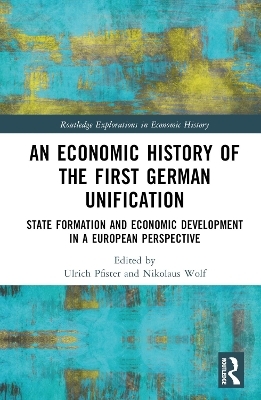
An Economic History of the First German Unification
Routledge (Verlag)
978-1-032-25483-8 (ISBN)
Twenty chapters written by leading experts in their respective fields deal with various aspects of the book’s main question. Together, they identify three channels by which national unification contributed to Germany’s economic development: (1) Creation of a nation-state completed a process of institutional Unification of a large inland area and thereby increased the integration of domestic markets. (2) Unification raised the capacity of the political system with respect to regulating complex domains, such as stock companies, patenting, and social insurance. (3) The emerging political regime of market-preserving federalism promoted the quality of economic institutions. Moreover, a set of chapters dealing with the experience of other European economies apart from Germany during the second half of the nineteenth century highlight additional factors in nineteenth-century economic development, most notably the first wave of modern globalization and economic geography.
Readers interested in the history of state building and the economic history of Germany and of Europe in general during the age of industrialization and globalization and students of the economic effects of political integration and decentralized state growth will all gain much from this book.
Ulrich Pfister obtained his PhD from the University of Zürich, Switzerland, in 1984. Since 1996, he is Professor of Social and Economic History at the University of Münster, Germany. His research covers agricultural history, proto-industrialization, demographic history, and historical national accounts. Nikolaus Wolf obtained his PhD from Humboldt University Berlin in 2003. After positions at the London School of Economics, Free University Berlin, and the University of Warwick, in 2010 he became Professor of Economics and Economic History at Humboldt University. He works on the economic history of Europe in the 19th and 20th centuries, with a focus on economic geography, trade, borders, and identity.
1 Introduction
Ulrich Pfister, Jan-Otmar Hesse, Mark Spoerer, and Nikolaus Wolf
Part I: Nation formation and the evolution of economic policy
2 National identity, economic integration, and the rise of Prussia
Felix Kersting and Nikolaus Wolf
3 Intergovernmental economic cooperation and institutional integration before the founding of the German Empire
Alfred Reckendrees
4 Politics, administration and market governance in a federalist environment: The German Empire in the 1870s and 1880s
Gerold Ambrosius
Part II: The formation of the nation-state as a structural and institutional turning point
5 Germany’s transition from a post-Malthusian to a modern growth regime, 1860s to 1880s
Ulrich Pfister
6 Fiscal regime, nation-building, and state capacity: Interactions among public finances, national unification, and economic development
Mark Spoerer
7 Nation-state formation and market integration: Postal service, telegraph system, and railways
Sebastian Till Braun and Jan-Otmar Hesse
8 The changing capacity for self-description: The creation of a national statistical service
Michael C. Schneider
9 The gold standard and the Reichsbank: The transformation of the monetary regime
Matthias Morys
10 Patent law and technical progress
Alexander Donges and Jochen Streb
Part III: Economic development and economic institutions in early Imperial Germany
11 Stock exchanges, banks and the panic of 1873
Carsten Burhop and Felix Selgert
12 How organised was capitalism in the Empire? Lobby associations, cartels and interlocking directorates
Eva-Maria Roelevink and Dieter Ziegler
13 Social insurance and its consequences for workers’ living conditions
Tobias A. Jopp and Jochen Streb
14 Inequality and its drivers in Germany, 1840–1914
Thilo N. H. Albers and Charlotte Bartels
15 Education systems and human capital accumulation
Sascha O. Becker, Francesco Cinnirella, and Erik Hornung
Part IV: State and economic development in a European perspective
16 Globalization and foreign trade
Wolf-Fabian Hungerland and Markus Lampe
17 Political change and the origins of protectionism: a French-German comparison (1860s to 1890s)
Jean-Pierre Dormois
18 The economics of the Italian Unification
Giovanni Federico
19 After exit: the Habsburg economy since 1870
Max-Stephan Schulze
20 British relative economic decline in the aftermath of German unification
Nicholas Crafts
Index
| Erscheinungsdatum | 08.03.2023 |
|---|---|
| Reihe/Serie | Routledge Explorations in Economic History |
| Zusatzinfo | 34 Tables, black and white; 50 Line drawings, black and white; 50 Illustrations, black and white |
| Verlagsort | London |
| Sprache | englisch |
| Maße | 156 x 234 mm |
| Gewicht | 879 g |
| Themenwelt | Geschichte ► Teilgebiete der Geschichte ► Wirtschaftsgeschichte |
| Wirtschaft ► Volkswirtschaftslehre ► Makroökonomie | |
| Wirtschaft ► Volkswirtschaftslehre ► Wirtschaftspolitik | |
| ISBN-10 | 1-032-25483-1 / 1032254831 |
| ISBN-13 | 978-1-032-25483-8 / 9781032254838 |
| Zustand | Neuware |
| Haben Sie eine Frage zum Produkt? |
aus dem Bereich


